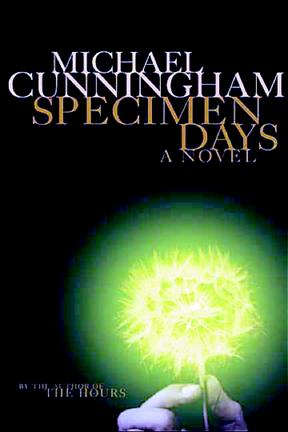Published in 1882, Specimen Days describes soldiers dead, dying or maimed in the Civil War and memorializes the assassinated President Lincoln. It also includes journal entries of the most staggering beauty. The contrast is striking.
This novel looks to Specimen Days and ties the scenes of death and destruction Whitman witnessed 150 years ago to those Americans saw on TV after the 9/11 attacks. Cunningham has said this is a book about prophecy, in the Whitman sense of the word.
“The word prophecy,” Whitman wrote in Specimen Days, “is much misused; it seems narrow’d to prediction merely. That is not the main sense of the Hebrew word translated ‘prophet’; it means one whose mind bubbles and pours forth like a fountain, from inner divine spontaneities revealing God.”
And so, this triptych of narratives involves prophetic individuals seeking a mystical connection with the world through creation. But in a very 21st century kind of way—in a world where suicide bombers believe they ensure everlasting life by taking their own (and many others’)—their sense of creation often involves destruction.
Set in New York City during the Industrial Revolution, the first section features a deformed 12-year-old named Lucas whose brother Simon was recently killed at a factory. Lucas responds to conversation with quotes from Whitman’s work. Needless to say, this makes him a bit of an outcast. Out of respect and financial desperation, he has taken over Simon’s job. When he discovers his brother’s betrothed could use some help, he sweetly wants to take over Simon’s role there, too.
For all its brotherly love, this is not a chummy tale. Lucas’ parents are haunted shells, convinced their dead son speaks to them from machines. Lucas’ father sips from an iron lung, inhaling Simon’s ghost with each breath. His mother rarely rises from her bed, transfixed by the songs Simon sings from a creaky music box.
This is strange material, far outside Cunningham’s previous reach, but he unspools his talent generously, writing a kind of mystical ghost story.
Next, he dunks us backwards into the second narrative, “The Children’s Crusade,” a taut, thriller-like tale set in present-day New York City involving a group of child terrorists named “the family” who are schooled in Whitman and who have taken to blowing themselves up on the city streets, taking lives with them, of course.
Halfway through, Whitman makes an appearance as a crazy old woman who has raised a trio of orphans in a small apartment, papered from floor to ceiling from Leaves of Grass.
It becomes apparent that if Whitman is this book’s guardian angel, New York City itself is its primary character. The first section describes a city rattletrapped and heaving with factories, a metropolis that created a whole new rhythm for human life. The second section unveils the city of today, a place that, to many of its residents, has become a big red X for terrorist activity.
The final section, “Like Beauty,” catapults us far into the future, when people are engineered and lizard-like aliens wander the streets. A nuclear meltdown has made it unsafe to go beyond New Jersey.
Cunningham has penned the tale of a city and a country engorged with death but looking for transcendence—often in the wrong places. It is a tale about a society mechanized beyond our wildest dreams, yet still possessive of the procreative urge.
Like its namesake, this novel is a work of genius so original it unfolds with a whiff of inevitability. You will find it hard to believe it did not exist before. That is what prophecy does; it brings the world full circle, creating and containing at the same time.
Cunningham understands this elliptical truth. He also knows that beauty and sadness always come hand in hand, but he asks, do they have to be united by destruction?









